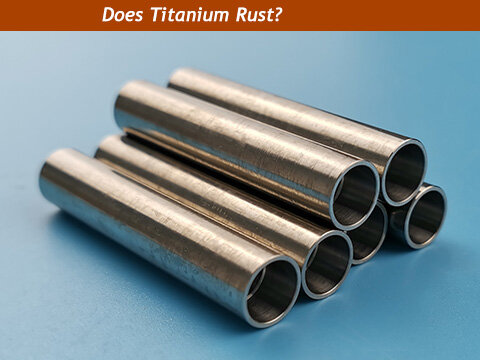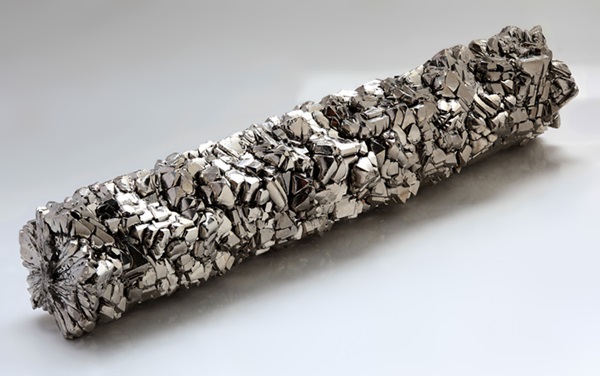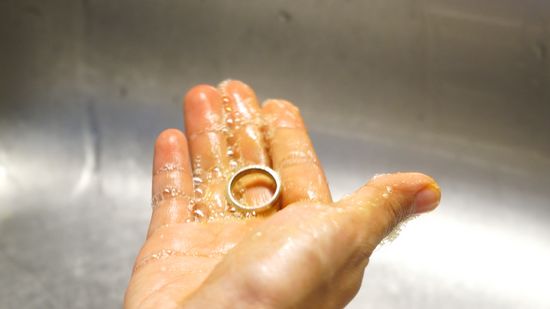Titanium's reputation for strength and lightweight resilience makes it a popular choice for everything from aerospace engineering to jewelry. But a common question lingers: Does titanium rust? This is a frequent concern, especially for those looking to use titanium in products exposed to moisture or harsh environments. Titanium is renowned for its strength and corrosion resistance, but understanding its behavior under various conditions is crucial. This article will answer that question in detail, exploring titanium's properties, its reaction to water, and how to best care for titanium items.

Titanium is a lustrous transition metal known for its high strength-to-weight ratio. It's as strong as steel but about 45% lighter, making it a valuable material in industries like aerospace, automotive, medical, and sports equipment manufacturing. Titanium is also biocompatible, meaning it's well-tolerated by the human body, leading to its use in medical implants and jewelry. One of titanium's most remarkable traits is its exceptional corrosion resistance. Unlike iron, which readily reacts with oxygen and moisture to form rust, titanium forms a protective oxide layer upon exposure to air. This layer acts as a barrier, shielding the underlying metal from further corrosion.

Does titanium tarnish? The short answer is no, pure titanium does not rust in the traditional sense. Rust, or iron oxide, is a specific type of corrosion that occurs when iron reacts with oxygen and water. Will titanium tarnish? Well, titanium forms a thin, transparent oxide layer (titanium dioxide) upon contact with oxygen. This layer is incredibly stable and adheres tightly to the metal's surface, preventing further oxidation and protecting it from corrosion. While titanium doesn't rust, it can tarnish under certain conditions. Tarnishing refers to a surface discoloration caused by a chemical reaction with the environment. In titanium's case, tarnishing can occur due to exposure to certain chemicals or extreme heat. However, this tarnish is usually superficial and can be easily removed with proper cleaning.

Can titanium rust with water? Titanium's resistance to rust extends even to exposure to water. Unlike iron, which readily corrodes in the presence of water and oxygen, the titanium dioxide layer acts as a barrier.
Can titanium tarnish with saltwater? Saltwater is notorious for its corrosive properties but does not cause titanium to rust. Titanium remains exceptionally resistant to corrosion, even in salty environments. The titanium dioxide layer ensures that titanium maintains its integrity and appearance even when exposed to harsh salt water conditions.
Does titanium steel tarnish due to other substances? While titanium is incredibly resilient, it is not entirely indestructible. Certain substances and conditions can cause damage to titanium. Here are a few factors that can affect titanium:

Titanium rings are a popular choice for their durability and hypoallergenic properties. Do titanium rings tarnish? Generally, a titanium ring won't tarnish easily due to everyday wear. But, exposure to harsh chemicals, cosmetics, or lotions can potentially lead to minor discoloration. This is more common with alloyed titanium that contains other metals. To keep your titanium ring looking its best, follow these simple care tips:

So, does titanium rust? The answer is no, not in the traditional sense. Titanium's resistance to rust and corrosion is one of its most defining characteristics. This remarkable property, combined with its strength, lightweight nature, and biocompatibility, has made it an indispensable material in a multitude of applications. While titanium doesn't rust in the traditional sense, it can tarnish under certain conditions. However, with proper care and maintenance, titanium items can retain their beauty and functionality for a lifetime. Whether you're wearing a titanium ring or relying on titanium components in a spacecraft, you can rest assured that this versatile metal will continue to perform admirably, even in the harshest environments.
Titanium jewelry can last a lifetime with proper care due to its exceptional durability and resistance to corrosion and scratching.
No, titanium does not rust faster than stainless steel. In fact, titanium is more resistant to rust and corrosion than stainless steel.
Yes, you can wear titanium in the shower as it is highly resistant to corrosion and water damage.
Explore titanium rings pros and cons to decide if they're the right choice for you. Read our full analysis, along with essential maintenance tips.
Read MoreLearn how to clean titanium ring effectively, from general methods to caring for ones with stones and color. Get tips to polish and maintain its shine.
Read MoreCan titanium rings be resized? Get answer to this question and explore alternative options for adjusting the size of your titanium ring to ensure a perfect fit.
Read MoreDiscover what does S925 mean on a ring with our guide. Learn about sterling silver purity, its value, and how to identify genuine S925 jewelry.
Read More